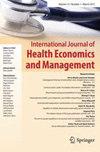Aspects of the development of clinical communication in medical practice
IF 1.5
4区 经济学
Q3 BUSINESS, FINANCE
International Journal of Health Economics and Management
Pub Date : 2021-03-13
DOI:10.14748/HEM.V20I1.7671
引用次数: 0
Abstract
The dynamically developing healthcare system poses new challenges for medical professionals related to the requirements of improving the quality of medical services, ensuring timely and adequate medical care. The specifics of the profession and the working environment in a medical institution strongly depend on modern social changes. Highquality medical care is the basis for the success of the treatment and diagnostic process, any manipulation and surgical intervention. The overall success of an otherwise brilliant medical procedure depends on a long, frequent recovery period. The final result in the field of health care is largely determined from accurately performed medical measures and their understanding. Communication with the patient and especially with their loved ones is the responsibility of medical personnel, which is of great importance for the mental health of the patient. Often, after the treatment, the patient leaves the hospital, not fully completing the treatment and continuing to need medical care, medical care. Until the middle of the last century, clinical competence in the world consisted mainly of three areas: medical and technical knowledge, physical examination, and medical problem-solving. Communication is not one of them. This is a basic and necessary clinical skill at all levels of medical education and medical professions. Worldwide, clinical lcommunication training is becoming a cultural phenomenon in Canada, which is one of the leaders, as well as in Australia, the United Kingdom, Israel, the Netherlands, the Scandinavian countries, South Africa, Spain, the United States, and other places.临床沟通在医学实践中的发展
动态发展的医疗保健系统对医疗专业人员提出了新的挑战,要求提高医疗服务质量,确保及时和充分的医疗服务。医疗机构的专业特点和工作环境在很大程度上取决于现代社会的变化。高质量的医疗护理是治疗和诊断过程、任何操作和手术干预成功的基础。一个杰出的医疗程序的整体成功取决于一个长期的、频繁的恢复期。卫生保健领域的最终结果在很大程度上取决于准确执行的医疗措施及其理解。与患者特别是与亲人沟通是医务人员的责任,对患者的心理健康至关重要。通常,在治疗结束后,病人离开医院,没有完全完成治疗而继续需要医疗护理、医疗护理。直到上世纪中叶,世界上的临床能力主要由三个方面组成:医学和技术知识、体格检查和医疗问题解决。沟通不是其中之一。这是各级医学教育和医学专业的基本和必要的临床技能。在世界范围内,临床沟通培训正在成为一种文化现象,在加拿大是领导者之一,在澳大利亚、英国、以色列、荷兰、斯堪的纳维亚国家、南非、西班牙、美国等地也是如此。
本文章由计算机程序翻译,如有差异,请以英文原文为准。
求助全文
约1分钟内获得全文
求助全文
来源期刊
CiteScore
3.60
自引率
0.00%
发文量
18
期刊介绍:
The focus of the International Journal of Health Economics and Management is on health care systems and on the behavior of consumers, patients, and providers of such services. The links among management, public policy, payment, and performance are core topics of the relaunched journal. The demand for health care and its cost remain central concerns. Even as medical innovation allows providers to improve the lives of their patients, questions remain about how to efficiently deliver health care services, how to pay for it, and who should pay for it. These are central questions facing innovators, providers, and payers in the public and private sectors. One key to answering these questions is to understand how people choose among alternative arrangements, either in markets or through the political process. The choices made by healthcare managers concerning the organization and production of that care are also crucial. There is an important connection between the management of a health care system and its economic performance. The primary audience for this journal will be health economists and researchers in health management, along with the larger group of health services researchers. In addition, research and policy analysis reported in the journal should be of interest to health care providers, managers and policymakers, who need to know about the pressures facing insurers and governments, with consequences for regulation and mandates. The editors of the journal encourage submissions that analyze the behavior and interaction of the actors in health care, viz. consumers, providers, insurers, and governments. Preference will be given to contributions that combine theoretical with empirical work, evaluate conflicting findings, present new information, or compare experiences between countries and jurisdictions. In addition to conventional research articles, the journal will include specific subsections for shorter concise research findings and cont ributions to management and policy that provide important descriptive data or arguments about what policies follow from research findings. The composition of the editorial board is designed to cover the range of interest among economics and management researchers.Officially cited as: Int J Health Econ ManagFrom 2001 to 2014 the journal was published as International Journal of Health Care Finance and Economics. (Articles published in Vol. 1-14 officially cited as: Int J Health Care Finance Econ)

 求助内容:
求助内容: 应助结果提醒方式:
应助结果提醒方式:


